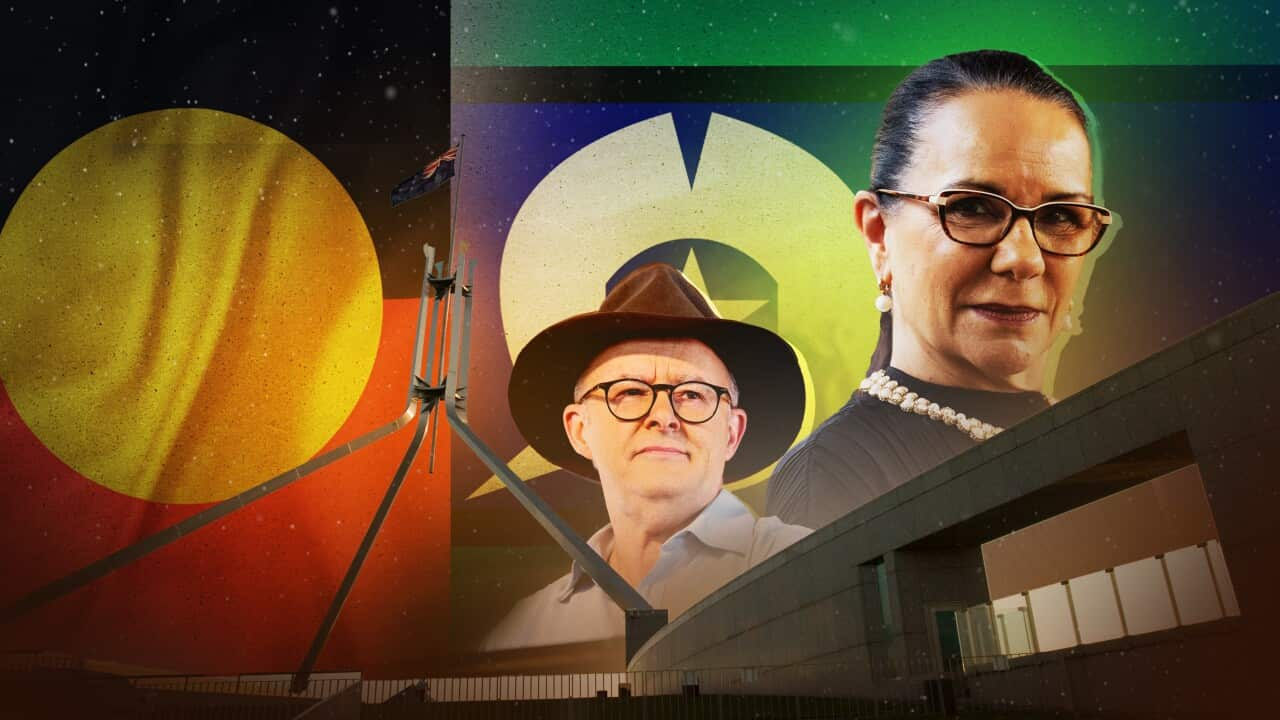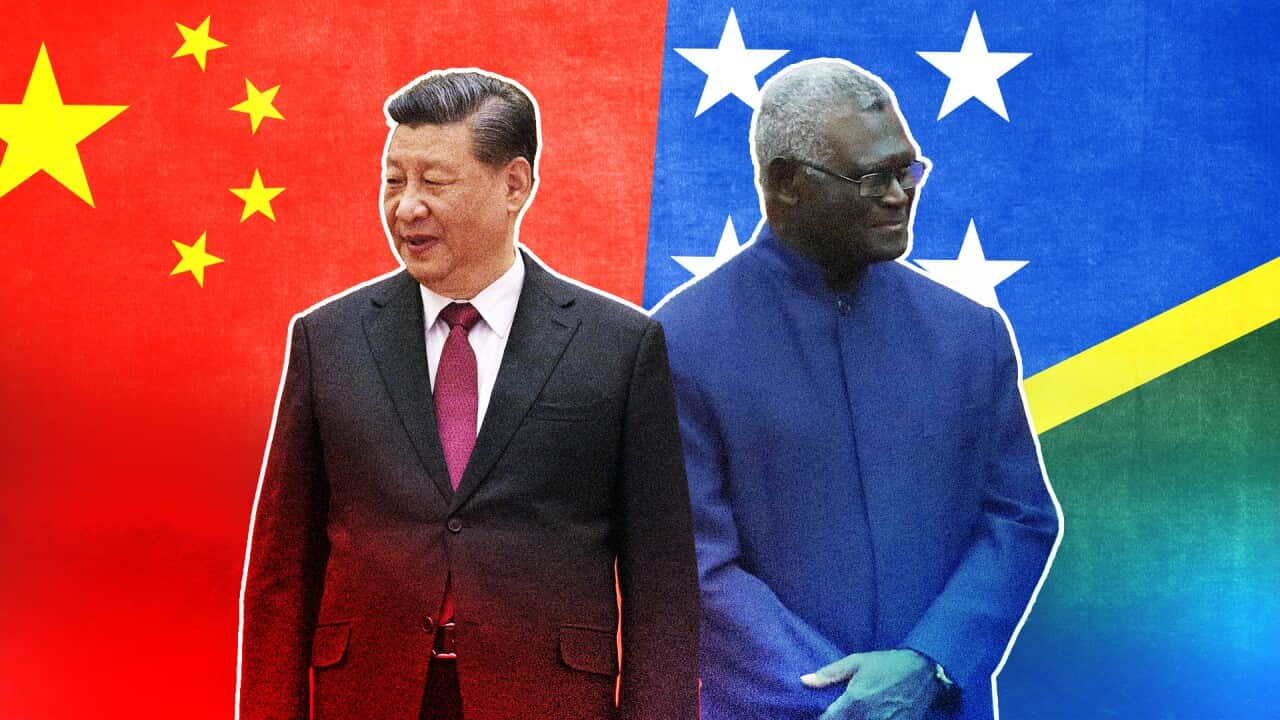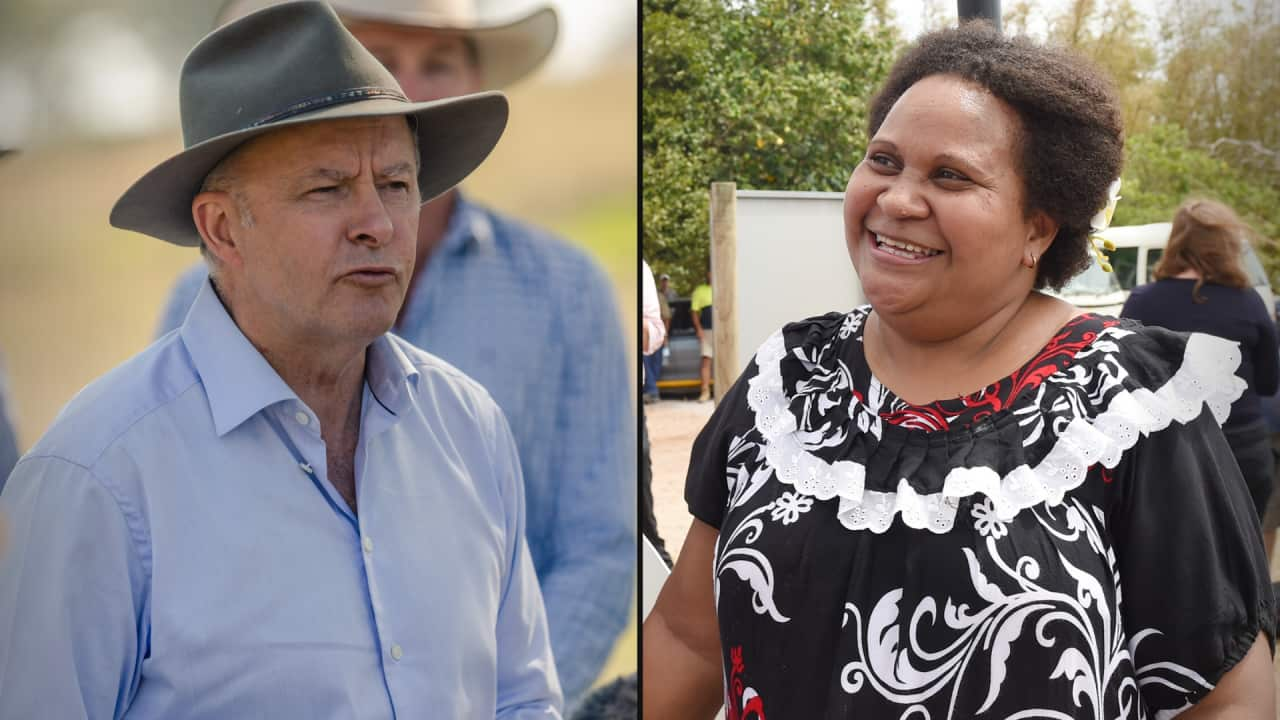As debate over the Voice to Parliament referendum continues, some Torres Strait Islanders are pushing for their own statement to reflect the wishes of the local people, separate from the Uluru Statement from the Heart.
Prime Minister Anthony Albanese, Indigenous Australians Minister Linda Burney and Queensland senator Nita Green to consult on the Voice proposal to give Aboriginal and Torres Strait Islanders people a say in the laws that affect them.
Representatives from more than a dozen island communities came together to deliver their messages to the prime minister.

Prime Minister Anthony Albanese declared his visit to the Torres Strait Islands a "huge success". But Melora Noah (right), a senior woman from Mer Island said her community had been ignored. Source: AAP
The Torres Strait is made up of hundreds of islands and at least 15 communities, spread across the very north of Queensland and sharing an international border with Papua New Guinea.
On Friday, Melora Noah, a senior woman from Mer Island, told SBS News her community was keen to explore self-government and a separate statement to the Uluru Statement from the Heart, the document calling for the establishment of a First Nations Voice in the Australian Constitution.
The resulting Voice to Parliament proposal came after extensive consultations conducted by Indigenous academics Marcia Langton and Tom Calma.
Professor Calma conducted talks in the Torres Strait, and told SBS News there would be places set aside for local representation under the proposed Voice to Parliament.
This includes two positions allocated to mainland Queensland, two for the Torres Strait Islands and an additional position to represent the majority of Torres Strait Islander people who live on mainland Australia, he said.
Professor Calma said while there are key differences in needs between each region of Australia, housing was a universal concern.
"What we're proposing is that Australia is divided up into 35 regions, and at least 35," he said.
"Each of those regions will have their own secretariat support. And within a region, they would collectively, and this is all Aboriginal or Torres Strait Islander people living in these regions, come and determine the priorities for that region. And the priorities will differ around the nation but we know, and it's almost universal as we travelled, the number one priority was housing."
Professor Calma said that if Torres Strait Islanders "as a collective want to get a statement of claims, I suppose, through a treaty process, they're quite within their rights to do that. And when the discussion about a national treaty takes place, they'll get the opportunity".
"But the Voice to Parliament is not about a treaty. It's about a mechanism to be able to enable Aboriginal and Torres Strait Islander people, irrespective of where you live or who you're affiliated with, to be able to have a say in those national matters that are going to affect affect them at a local level," he said.
But the Voice proposal does not go far enough for some, including Ms Noah.
Ms Noah said the Uluru Statement from the Heart is a "good idea" but the Albanese government needs to factor in differences between Aboriginal and Torres Strait Islander peoples.
"I welcome that statement. I think it's a good idea ... But for us, for the Uluru Statement from the Heart, our prime minister and our Indigenous minister Linda Burney must factor into that statement that there are two distinct races of people: the Aboriginal people and the Torres Strait Islanders," she said.
Ms Noah said the Uluru Statement from the Heart is "from the Aboriginal people. It's their homeland."
"Now our prime minister really needs to come to the motherland of the Torres Strait Islanders and do our statement," she said.
The Deputy Mayor of the Torres Strait Island Regional Council told SBS World News that a number of groups on different islands feel a similar way.
“I sympathise with the people of Mer (Island),” Deputy Mayor Getano Lui Jnr said.
“We want to pursue our own statement from the Torres Strait."
On Mer Island, some community members with links to the Solomon Islands are now looking to China as a possible source of new investment, arguing the Australian government has let them down.
“We look across and watch Melanisian brothers and sisters and we're thinking, well, maybe that's an option for us,” Ms Noah said.
“Is Australia still interested in us? Does Australia still want to take care of us? Or should we look elsewhere?
“We don't go out and, you know, look for China to come in and set up a military base here. All we want to do is feed our family.”
But Professor Calma said any negotiations with China would have to be approved by the Australian government.
"The Torres Strait Islanders cannot do that independently. They are part of Australia and any foreign arrangement with Australia has to be cleared by the Australian government," he said.
"There's a formal process."
Professor Calma said he "personally attended the visit to Thursday Island, where we consulted with Torres Strait Islander people as well as the Torres Strait Regional Authority [TSRA]".
"During those consultations, we heard very clearly that members of the Torres Strait Islander community did not see the Torres Strait Regional Authority as their spokesperson. And then in subsequent discussions with the TSRA, they also acknowledged that they couldn't speak on behalf of everybody," he said.
"What we looked at within the whole co-design process for the Voice to Parliament was a really inclusive process so that people, whether they were members of Indigenous organisations or just members of the community, had the opportunity to be able to have an input. And I think as time develops, we will see that take place.
"The prime minister has already acknowledged that the final report on the Voice to Parliament that [Professor Langton] and I co-authored would be the foundation to start the discussion on how these arrangements will take place."
Ms Noah said while she was glad Mr Albanese visited Thursday Island, he didn't actually visit the Torres Strait "motherland".
"Sometimes when politicians come up, they come to Thursday Island, and they think they're in the Torres Strait. But no, the motherland of the Torres Strait is out here. Thursday Island and the River Islands are just Aboriginal land, which are highly populated by Torres Strait Islanders," she said.
"So I'm glad that the prime minister visited, but he didn't quite make it out to the real Torres Strait. So we look forward to that visit."
Ms Burney said she was pleased to meet with representatives from across the Torres Strait.
"The Torres Strait community will continue to have an important role in consultations on the implementation of the Uluru Statement, including the referendum for an Aboriginal and Torres Strait Island Voice to Parliament," she said.
Mr Albanese acknowledged that Torres Strait Islanders wanted to be "heard" in the Voice to Parliament.
"The general position of the Torres Strait Islanders is they want to make sure the voice of a minority within a minority is heard through those structures," he said.













